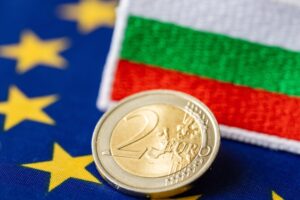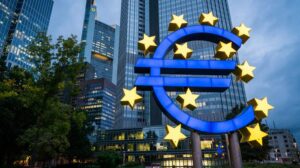
Consumer price growth in Ukraine slowed to 0.2% in December 2025 from 0.4% in November and 0.9% in October, the State Statistics Service (SSS) reported on Friday.
The statistics agency recalled that in December 2024, consumer price growth was 1.4%, so in annual terms, inflation at the end of December this year decreased to 8% from 9.3% at the end of November and 10.9% at the end of October, and was lower than inflation in 2024, which was 12%.
It is noted that in December 2025, core inflation also fell to 0.1% from 0.3% in November and 0.6% in October. Given that in December 2024 it was 1.3%, core inflation slowed down to 8% in annual terms at the end of the year, from 9.3% in November and 10.2% in October.
In the consumer market in December, prices for food and non-alcoholic beverages remained largely unchanged. At the same time, prices for eggs, grain products, fish and fish products, bread, sunflower oil, lard, vegetables, beef, and milk rose by 5.6–0.7%. At the same time, prices for fruit, sugar, poultry, pork, rice, fermented milk products, non-alcoholic beverages, and butter fell by 4.1–0.2%.
Prices for alcoholic beverages and tobacco products rose by 1.0%, which is associated with a 1.9% increase in the cost of tobacco products.
Clothing and footwear fell in price by 3.9%, in particular, footwear by 4.4% and clothing by 3.6%.
Transport prices rose by 0.7%, mainly due to a 1.3% increase in the cost of passenger rail transport and a 1.1% increase in the cost of fuel and lubricants.
As reported, inflation in Ukraine, which fell to 5.1% in 2023 after jumping to 26.6% a year ago, rose to 12% at the end of 2024.
At the end of October, the National Bank of Ukraine improved its inflation forecast for 2025 to 9.2% from 9.7% in its July macro forecast and left its inflation estimate for 2026 at the previous level of 6.6%.

In Bulgaria, amid the transition to the euro, some of the population remain concerned about possible price increases and heightened political tensions, according to media reports.
The country will join the eurozone on January 1, 2026, becoming the 21st country to adopt the single European currency.
There are also reports of a protest campaign under the slogan of preserving the Bulgarian lev, and according to Eurobarometer, about 49% of Bulgarians oppose the introduction of the euro.
The article notes that the ECB and European institutions point to the potential benefits of the transition, and the fixed conversion rate is set at 1.95583 leva per euro.
At the same time, according to media reports, the Bulgarian parliament strengthened control mechanisms in the summer to stop unjustified price increases when the currency changes.
Possible scenarios for the rise in the cost of living due to the introduction of the euro: the mildest scenario is a short-term “rounding” effect in retail trade, when some prices are rounded up, which usually contributes slightly and temporarily to inflation.
A more severe scenario is attempts by individual sellers and services to take advantage of the transition period and raise prices more than the conversion dictates, against the backdrop of already noticeable increases in the cost of food and real estate in 2025.
A negative scenario for citizens is if the rise in prices in the consumer basket outpaces the indexation of wages and pensions, real purchasing power will temporarily decline even with a formally small increase in inflation.

The Experts Club analytical center analyzed Albania’s economy for the first 10 months of 2025 and presented its analysis and forecast. Based on the results of the first ten months of 2025, Albania continues to have one of the highest growth rates in Europe, with low inflation, stable currency reserves, and continued growth in tourism, but it faces a slowdown in industrial output and an expanding trade deficit.
According to IMF mission estimates and national statistics, Albania’s real GDP grew by approximately 3.4–3.6% year-on-year in the first half of 2025, which is comparable to 2024 figures and above the European average. The main drivers of growth remain the service sector, construction, and tourism: foreign tourists alone spent around €2.1 billion in the country in the first six months, which is 7–8% more than a year earlier.
International institutions expect the economy to grow by around 3.4-3.7% by the end of the year: after its autumn mission, the IMF raised its forecast to 3.5% for 2025, while the World Bank and the EBRD also expect growth of over 3%.
Inflation in the country remains low and close to the target level. According to the IMF and national statistics, annual consumer price inflation in 2025 is around 2–2.3%.
The labor market situation is improving moderately. The unemployment rate in the second quarter of 2025 fell to 8.5%, which is significantly below the historical average (around 14%).
Industry remains the most vulnerable sector. According to estimates by research centers and statistics, industrial production in Albania in the first quarter of 2025 declined by approximately 2.1% compared to the same period in 2024, while in the second quarter the decline slowed to around 0.5%. Manufacturing output in June 2025 was 0.9% lower than a year ago. This reflects the problems of traditional export industries, primarily textiles and clothing, which are under pressure due to the strengthening of the national currency and demographic outflow.
The external sector remains a weak spot in the macroeconomy. According to Albanian think tanks and INSTAT, the trade deficit in goods widened to about 25.3% of GDP in the first half of 2025, despite high tourism revenues. Remittances from migrants grew by about 5% to €1.2 billion, remaining an important source of external revenue, while foreign direct investment stabilized at around €1.1 billion over the same period.
At the same time, external stability appears comfortable. According to Trading Economics, Albania’s international reserves reached $7.3 billion in September 2025. In its final Article IV statement, the IMF explicitly notes “strong reserves, declining public debt, and one of the highest growth rates in Europe” as a basis for further reforms and deeper integration with the EU.

Consumer prices (CPI) in the eurozone rose by 2% year-on-year in June, according to final data from the European Union’s statistical office. This represents an acceleration from 1.9% in May (the lowest rise in eight months).
The figure was in line with previously announced data and the consensus forecast of analysts cited by Trading Economics.
Consumer price growth in the eurozone is close to the European Central Bank’s target, indicating that the regulator has managed to bring inflation under control.
The rise in prices for services in the eurozone accelerated to 3.3% last month from 3.2% in May. The cost of food, alcohol, and tobacco rose 3.1% after a 3.2% increase in May. Energy prices fell 2.6% after dropping 3.6% a month earlier, while industrial goods rose 0.5% (in May – 0.6%).
Consumer prices excluding food and energy (Core CPI) rose by 2.3% year-on-year in June, the same as a month earlier. This was in line with both previously announced rates and experts’ expectations.
The CPI index in June rose by 0.3% compared to the previous month.
Source: http://relocation.com.ua/acceleration-of-inflation-in-the-eurozone/

The European Central Bank (ECB) considers the current level of key interest rates to be justified and remains committed to the goal of maintaining inflation in the euro area at 2% in the long term, ECB President Christine Lagarde said.
“Our aspiration, commitment and duty is to ensure price stability, and this corresponds to inflation in the region of 2%,” she said in an interview with the German newspaper ARD. “We have succeeded, inflation is already at 2%, and we will continue to work in this direction.
“We will do everything necessary to ensure that inflation remains at this level,” Lagarde added. “Uncertainty is high, we are surrounded by unpredictability, but there is confidence and stability in terms of prices.
Meanwhile, François Villeroy de Galo, Governor of the Bank of France and member of the ECB Governing Council, warned that the 14% strengthening of the euro since the beginning of the year poses a risk of too low inflation.
In his opinion, a 10% rise in the euro reduces inflation by 0.2 percentage points over the next three years.
“This may increase the risks that inflation will be below our target, and we cannot ignore this,” de Galo said.
Earlier, ECB Vice President Luis de Guindos noted that the rise of the euro/dollar pair above $1.2 could complicate the central bank’s task of achieving the target inflation rate.
The ECB has cut rates eight times over the past year, and now the key deposit rate is 2%. Analysts and market participants generally expect that the regulator will not change rates at the July meeting in order to assess the impact of the measures already taken on the eurozone economy.

In the period from January to May 2025, inflation in the Netherlands showed moderate growth, remaining above the eurozone average. According to data from Statistics Netherlands (CBS), consumer prices rose by 3.3% in January compared to the same month last year, down from 4.1% in December 2024.
According to the Indeflatie website, the average inflation rate in the Netherlands for 2025 is 3.7%, which is higher than the 3.35% recorded in 2024.
The main factors contributing to inflation are rising prices for housing, water, and energy, as well as an increase in the cost of services due to rising wages.
However, despite moderate inflation, there are external economic risks that could affect the country’s economic situation.
In particular, a possible escalation of trade relations between the US and the European Union could lead to an increase in inflation in the Netherlands by 0.5 percentage points in 2025 and 2026.
Thus, in the first half of 2025, inflation in the Netherlands will remain moderate, but external economic factors could have a significant impact on further price dynamics.
Source: http://relocation.com.ua/inflation-in-the-netherlands/